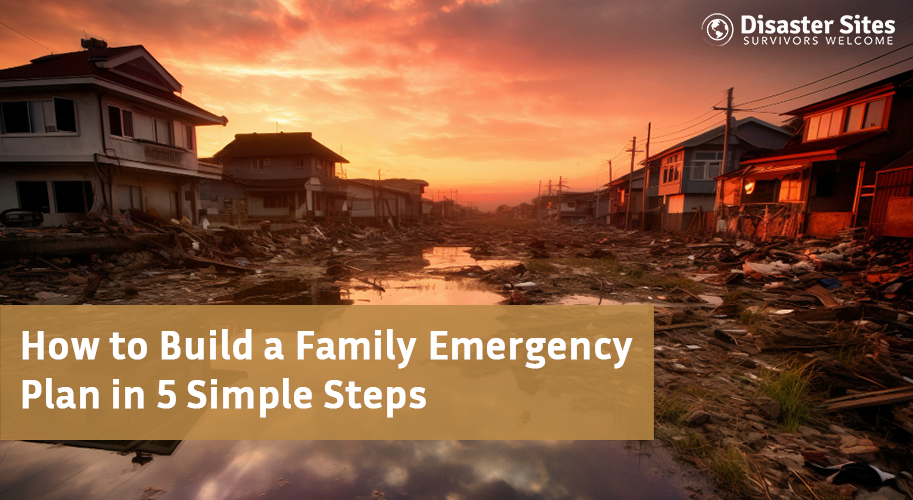FEATURED
SPONSORED
VERIFIED

Sep 8 -
7 minutes, 21 seconds
-81 Views 0 Comments 0 Likes 0 Reviews

Emergencies can happen anytime, anywhere: flooding, earthquakes, hurricanes, fires, or sudden medical emergencies. Your day can also change in a second, where normally it can turn into chaos. Often, once fear sets in, people have a hard time quickly thinking about the proper way to react, which is exactly why it's important to have a family emergency plan, or a plan of reference do to provide you with a clear map of action, where you will go and how you will communicate, without having to panic in the moment of an emergency.
Good emergency planning is not only about your immediate safety, it also helps you build up and maintain confidence so that you can respond to emergencies calmly, and with peace of mind. A plan will ensure that every family member knows their duties, knows who are emergency contacts, and knows where it is to meet safely. When every family member knows what to expect, if and when you need to act quickly, you will be able to do so promptly, with fewer errors, and less stress to complete.
First you need to plan a strategy for what types of disasters are coming as it will help you further. The risks will differ depending on your location. For starters, coastal areas are more likely to experience hurricanes, flood plains may have flooding issues, and locations which have earthshaking activity warrants some level of preparation for earthquakes. Gather data about your local danger and develop a list of threats that could impact your family. This information will help you develop relevant action steps, supplies, and evacuation routes for your family's safety.
If the emergency occurs then you should be with your family so that it can be easy to go to a safe place. Also be prepared about how you will contact your family. Think about if contact will be through phoning, sending text messages or even using messaging devices. Have a central meeting place close to your home and a central meeting place outside your neighborhood for situations when the travel in the area is unsafe. Have a contact person out of town where you can get information through whenever direct communication fails, if applicable. You should be sure that all the family members are learning the important contact information and keep a copy of it in a place that they can find easily.
Reliable communication can be a lifesaver, as proven during Tourists Stranded in North Sikkim After Heavy Rains and Landslides where quick contact kept families informed and safe.
In an emergency, it is possible to save time and lives by the techniques used in mobilizing and executing your plan. That said, roles should be assigned to the family members based on strength and capabilities-whoever can secure supplies, who can secure the animals, who will need to interject the call to family members! Even kids can do basic jobs; for example, they can carry a small emergency kit, or help out carrying a younger sibling if necessary. There is no ambiguity, no time-wasting allocating duties and therefore no risk of misplacing anything, while keeping cool and focused.
The most important aspect in an emergency is communication. Identify preferably one means of communication such as calling or texting, or a family group chat, together with a secondary method that can be used if the networks fail. An out-of-town person should be appointed so that all family members can reach out to this individual if separated from one another. Encourage family members to share this important numbers list, both saved in their phone and written in a notebook. Good communication planning will make sure that no one will be left wondering where their loved ones are, and if they're safe.
Backup communication options are vital when networks fail, a challenge detailed in Myanmar Earthquake 2025: Crisis Persists as Thousands Wait for Lifesaving Relief.
All family members need to know how to follow a plan for it to be effective. Schedule a regular time throughout the year for family drills to practice following your plan to evacuate your home or go to one location to meet or to contact other family members in emergencies. You should include children to allow time to become comfortable with the practice.
Update your plan whenever changes happen regarding the family, home, or local emergency plan. Practicing builds confidence. When an emergency arises, your family will react quickly, effectively, and smoothly to the emergency situation.
An emergency family action plan is more than just a list of steps, it is a family’s plan of protection to keep everyone safe during an emergency. Taking the steps to prepare ahead of time will reduce confusion, save time, and keep your family safe instead of on the edge of panic, which is what an emergency could look like. Completing every step with contact lists, practicing scenarios, etc. will raise your family’s level of primed preparedness. Emergencies can occur unexpectedly but having a plan with key details and lines of communication will prepare you to face those unexpected events in confidence, unity and with peace of mind.

Our Mission... “To assist disaster survivors by providing a source for them to come together in time of need, to aid in the listing of events, information and other forms of assistance, and continuing support through the recovery process.”

Share this page with your family and friends.